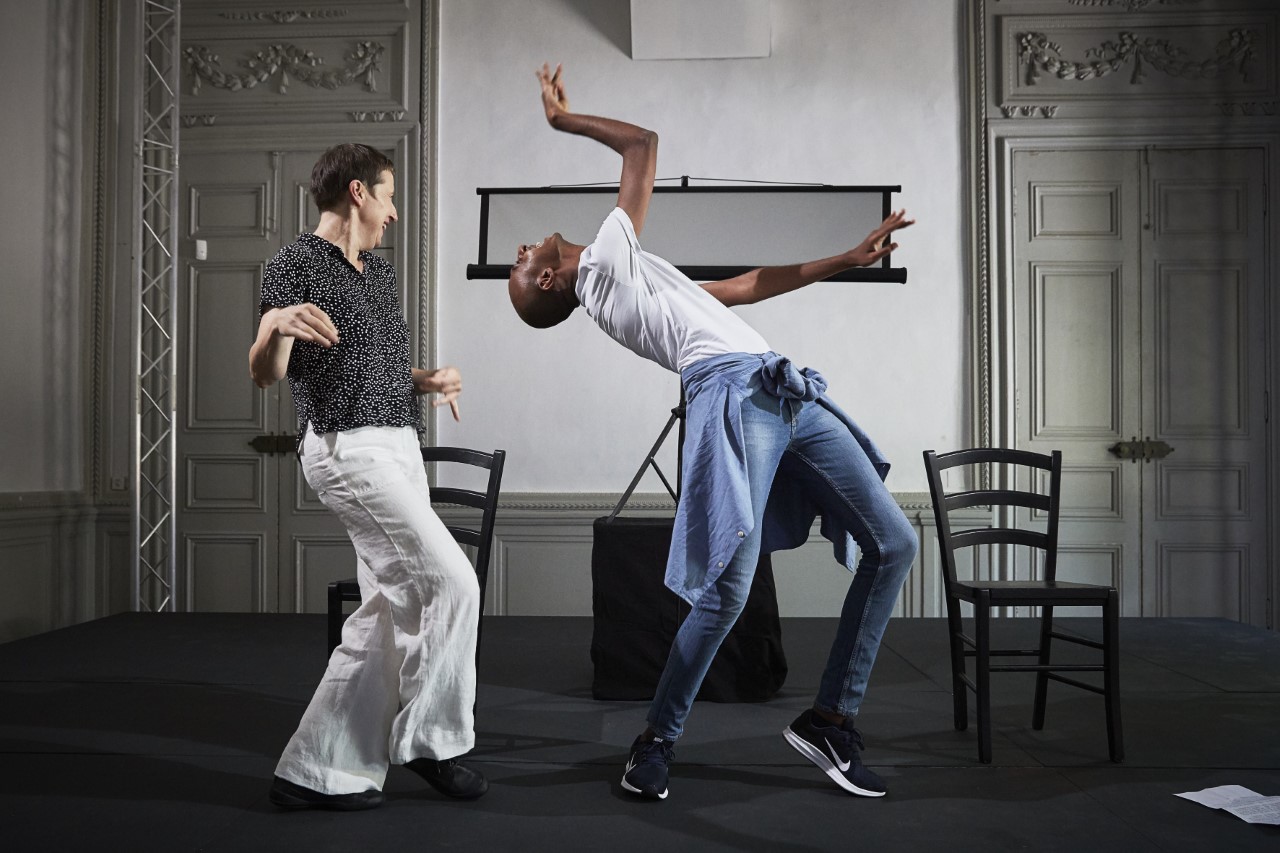Avignon 2019: Seeking the Other – Staging the Paroxysms of Orientalism
By Yana Meerzon |
MAHMOUD & NINI is an unusual show –not only it does not look like your typical proscenium theatre, with elaborate plots and developed characters, colorful costumes and sets; it also reminds one of a lecture hall. Two people –Mahmoud: a Egyptian man, black, homosexual, speaking Arabic; and Nini: a French woman, white, with a shorthair and complex ancestry, speakingFrench–sit next to each other, facing audience. They use direct address to enumerate assumptions about each other and their cultures, all based on biases and stereotypes. It is unclear whether they’re seeking understanding or simply re-enforce what people of different backgrounds think of each other ; whether they want to show our ignorance and how dependent we can be on media discourses, or propose some kind of action or solution to these endless miscommunications that only breed fear and mistrust.
It is also difficult to see whether the action moves forward, or even if there is any action. But with every question they ask or joke they make, the atmosphere of this performance gets more and more tight and uncomfortable, with the audience becoming more edgy but also more reserved.
Your hair is short –in Egyptian culture you would be considered a lesbian, Mahmoud offers.I am an actress and can wear my hair as I wish, Nini responds. Yes, Mahmoud says, but in Egypt if you are an actress,your hair is long and beautiful,and you do not look or act as a lesbian. The characters speak in their native languages –he in Arabic, she in French. There is a small screen above them onto which every line translated in its respective language is projected. Mahmoud and Nini, however, does not seem to need these translations –they are only actors speaking the text, they do not really need to communicate.
Women in Egypt wear hijab and are expected to do as they are told, Nini continues. They must take care of their families and children; whereas men can work,and smoke,and relax as they wish. In France,women can work,and they feel equal to men. In Egypt you should really start working toward these liberal practices… My friends chose to wear their hijab, it is their choice, their free will –Mahmoud responds.
Do I agree with it? I don’t know, it is complicated. My position is complicated –a black man in Egypt, a Muslim and a homosexual. I might disagree with their choices, but I cannot impose them.But this is what we do –western liberals and leftist thinkers –we impose our discourse, our values on the other. Should we disagree with Nini? Of course not! Women should have their own rights and must to be able to chose what they want to do and be. But should we impose these ideas on the other cultures as freely and somewhat disrespectfully as we often do?
Sitting at the Maison Jean Vilar on this hot afternoon, it is not only I who asks these questions, I am convinced. The audience of this show is predominantly white, middle aged and French speaking, just as Avignon’s general festival crowd . I bet they recognize and identify with lots of prejudices that Nini articulates. The actors’ frontal position re-enforces this idea of the mirror –the words they say and the ideas they propose make each spectator, whether he/she wants to or not, confront his / her own cultural preconceptions.
The characters speak of politics and asylum-seeking procedures in France, about religion and terrorism, about the Charlie Hebdo incident and belly dancing. At the end, Nini proposes they change places –perhaps,it is time to look at each other from a different perspectives? Perhaps,it is time to dance? Perhaps, Mahmoud asks, it is time to stop translating? No, Nini responds, we must continue with the practices of translation. To try to understand each other we must translate again and again, and so they remain in their original spots, facing the audience, speaking in Arabic and French.
The idea of this dramaturgy originated, as the director Henri Jules Julien says, from a series of meetings the performers held and questions they asked each other, all “designed as an experiment in prejudices”.The performers “wrote down lists of stupid questions they’d heard countless times, of preconceptions, of discouraging or revolting clichés. We laughed a lot, of course, mostly at ourselves”. Translating those encounters into a dramatic text presented another problem of ethics, as Julien explains: “what right did I have to rephrase their questions, to ‘make them say ’what was important to me but maybe not to them, how legitimate was I in ‘representing Nini and Mahmoud, even if they’d become ‘characters’?” As a result, in its philosophy the show oscillates between Said’s Orientalism and Marx’s ideas on who holds the right of representation. In its staging, MAHMOUD & NINI asks more questions, mostly about ethics, and much like these: “who’s talking? who’s making whom talk? where does the one talking talk from?”It also invites its audience to face the uncomfortable truth about living with the other amongst us, to paraphrase Ulrich Beck’s formulation of today’s world as the place for inter-, cross-, and trans-cultural cosmopolitanism.
